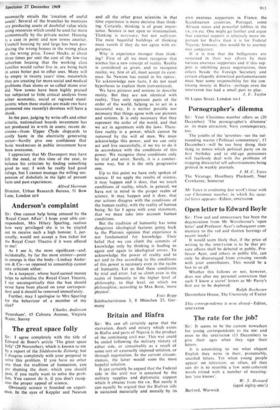The great space folly
Sir: I agree completely with the title of Edward de Bono's article 'The great space folly' (29 November), which is known to me by a report of the Siiddeutsche Zeitung, but I disagree completely with your proposal to solve this problem. If you have no other one than the tradition of humanism, you are shutting the door, which you should Pass, if you really want to solve the prob- lem. You cannot do it, if you don't recog- nise the proper appeal of science.
Obviously science is founded on experi- ence. In the eyes of Keppler and Newton and all the other great scientists in that time experience is more decisive than think- ing. Certainly, thinking is of great impor- tance. Science is not open to irrationalism. Thinking is necessary, but not sufficient.
The most beautiful buildings of thinking must vanish if they do not agree with ex- perience.
Why is experience stronger than think- ing? First of all we must recognise that science has a new concept of reality. Reality is considered as given, and to recognise reality, we, first of all, must accept its exist- ence. So Newton has stated in his optics: To acknowledge new facts, I do not need hypotheses to explain them (retranslated).
We have pictures and notions to describe reality. But they are not identical with reality. They only represent parts of the order of the world, helping us to act in a successful way. It is neither possible nor necessary that things agree with our pictures and notions. It is only necessary that they represent the order of the world, and that we act in agreement with the laws. There- fore reality is a power, which cannot be removed by the will of men. We must acknowledge this power, and we can only act and live successfully, if we try to do it in accordance with the conditions of this power. We recognise these conditions only by trial and error. Surely, it is a cumber. some way, but it is the only progressive one.
Up to this point we have only spoken of science. If we apply the results of science, it may happen and it does, that we touch conditions of reality, which, in general, we have not in mind in the proper realm of science. It may happen and it does, that our actions disagree with the conditions of the human reality, with the reality of human being. So far I agree with your statement, that we must take into account human conditions.
But the tradition of humanity has some dangerous ideological features going back to the Platonic opinion that experience is not fundamental for knowledge. Their belief that we can climb the summits of knowledge only by thinking is leading us again and again to ideological errors. To acknowledge the power of reality and to act and to live according to the conditions of this power is necessary even in the realm of humanity. Let us find these conditions by trial and error. Let us climb even in the realm of humanity to the higher level of philosophy, to that level, on which we philosophise, according to Max Born, 'more physico'. Fritz Bopp Sulzbacherstrasse 3, 8 Munchen 23, Ger- many














































 Previous page
Previous page